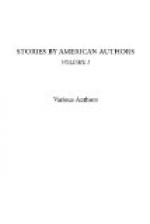Barwood replied as best he could; he did not know exactly what. He was in no mood for flippancy. He assumed a dozen different positions in a short space: first sitting on a camp-chair beside her, then hurried walking up and down, then careless prostration upon the grass. The old, useless argument was gone through with again. She told him at last that it annoyed her, that he was very inconsiderate. Then again he paced up and down the little croquet ground. She saw him twisting and clutching his hands together behind him. At the fifth or sixth turn as he came by she had the marked shekel in her hand. He took it from her and looked at it curiously.
“Yes, it is indeed,” said he in an unnatural voice, “fatal money, and I am its latest victim!”
He threw it towards the woods with great force.
It rose high in the air, skimmed the trees, and they saw it twinkle into the brook.
It was a very little incident. No magic hand arose from the water. The beauty of the August day was not marred. The rain of the past night had swollen the brook, which ran hurriedly on to the Potomac, making little of this trivial addition to its burdens.
Nina did not reproach him. She felt that her father would consider the loss irreparable, yet she had no words for this extraordinary rudeness. After two or three turns more in his walk he stopped close beside her.
“For the last time,” said he, “have I urged everything, and is it of no use?”
She made no answer.
“You have said so?” he persisted.
“Yes, I have said so,” she replied, with a touch of impatience, and without raising her eyes. “I am engaged to Mars Brown.”
He went forward several steps and stood still. Glancing up she saw him hold a little revolver to his temple. It was one she had known him to carry for protection when riding late in the evening. He seemed to deliberate one terrible moment while she sat spell-bound as if by nightmare, and then he fired and fell.
She tried to reach his body, but fainted on the way. Mars Brown, riding to Holbrook for a half-holiday, was almost within sight.
Upon the closing scene of Hamlet, where the characters, after a period of stormy conflict and exquisite anguish, lie strewn by violent death, arrives young Fortinbras at the head of his marching army. Tall, sturdy, elastic, dressed in chain-mail, victorious, careless, the impersonation of ruddy life, the young Norway conqueror leans upon his sword above the pitiable sight.
So this brilliant young man, elegant in figure, well dressed, joyous, cynical, came whistling up the path. He cut off the clover tops with his walking-stick. The butterflies, the pleasant aromas, and all the manifestations of rural beauty pleased him.
“Egad,” said he, “this isn’t so bad, you know.”
In a moment he stood by the apple-tree, and the whole sad spectacle was before him.




